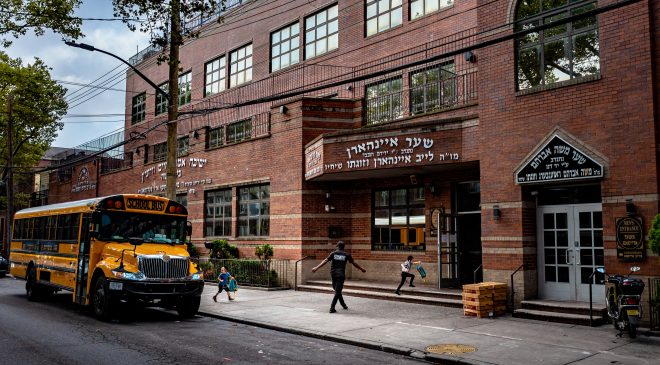
At his small north London high school, 15-year-old Yossi Hamilton pores over sacred texts as his Jewish ancestors did for over two thousand years, part of a curriculum that he says prepares him for his future. This special faith-based education is profoundly important to Hamilton’s strictly Orthodox Haredi Jewish community, which numbers 80,000 in Britain. Many are the descendants of Holocaust survivors and are extremely protective of their way of life. Educating its children in private schools and at home, the Haredi community, along with some Muslim and Christian groups in Britain, says it is deeply troubled by a new government-backed proposal to register all home-schooled children. Although the proposed new legislation wouldn’t directly affect pupils in schools such as Hamilton’s, faith groups see it as the state exercising more control over education and fear it could ultimately lead to new rules on what children are taught both at home and at school.
“This intrusion by the state not only threatens parental rights and fundamental freedoms but also puts at risk the faith, culture and traditional way of life cherished by the strictly Orthodox Jewish community,” said Rabbi Asher Gratt, a former governor at the biggest Haredi school in London. Echoing those concerns, Randall Hardy, a Christian who home educated his children, said: “Calls for registration are not just about knowing where children are, they are ultimately about overseeing what all children are taught, which is why many Christians are concerned about bills like this one.” All children in Britain from the age of five must be in full-time education. They can be in state or privately-run schools, or be home educated. The government says it needs the new legislation as there is no legal obligation to report whether a child is home schooled. It estimates 86,200 children were being taught at home as of early 2023.
“There are children falling through the net at the moment,” said Flick Drummond, a lawmaker with the ruling Conservative party who is behind the bill in England. The legislation has no intention of targeting faith communities, she added. While schools are inspected by a national body, local authorities can check the quality of home schooling once they know a child is taught that way. “Every child has the right to a safe and suitable education,” said a spokesperson for the Department of Education. But who defines what is “suitable” is why some faith groups are alarmed. At present, “suitable” is defined as including numeracy, literacy and skills to equip them for life within the wider community. Hamilton is a student at the Beis Medrash Elyon high school for just over 90 boys, which is funded by donors and fees.
“As long as possible I want to sit and ponder the Talmudical texts … and then I will go into the workforce and add to the English economy,” Hamilton said. The students’ nine-hour day begins with intense learning of the Talmud, a study of Jewish law, and is followed by core subjects such as maths and English, as well as sports. Pictures of Rabbis adorn the walls of the modern building, which also has an indoor soccer pitch and a snooker table. Lessons omit the modules on sex education and sexual diversity typically taught to their secular peers, which are deemed inappropriate or contrary to biblical teachings by the school and parents. Pupils use computers, but smart phones are not allowed. The boys leave at 16 to pursue advanced religious studies before marriage and careers typically in commerce. Underlying the tensions at play between the community and secular state, the government’s educational standards office Ofsted, which inspects schools, said in 2021 the school’s secular curriculum was too narrow.
A later inspection found more focus on secular subjects, but said the teaching did not pay enough regard to sexual orientation and gender identities. This limits pupils’ preparation for life in modern Britain, it said. In Israel, the fast-growing Haredi community faces similar accusations by secular Israelis of not preparing their children for modern life and especially for work in the modern economy, a charge they reject as biased against their way of life. Shakeel Afsar is a Muslim property developer who led protests outside a primary school in the British city of Birmingham in 2019 over its teaching on same-sex relations. “Today, they (the authorities) are asking for a register to know about the welfare of the child, but where will it stop? Tomorrow they might be saying to parents if you are home schooling you must cover syllabuses that are completely against your Abrahamic faith,” he said. Despite government assurances about the intentions of the register, the Haredim fear interference. “Hear our pain and our deep request to leave us alone to allow us to keep our identity,” said Rabbi Herschel Gluck, a Haredi community leader.
